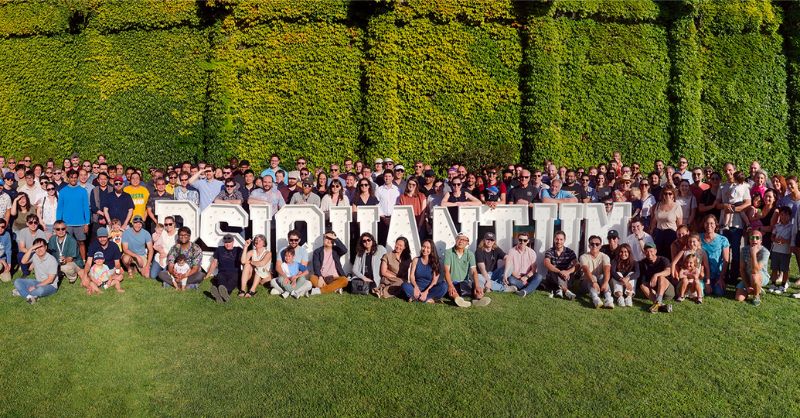Science
PsiQuantum Secures $1 Billion to Advance Quantum Computing Technology

PsiQuantum, a California-based startup, has successfully raised $1 billion in a Series E funding round aimed at advancing its photonic quantum systems. This investment significantly increases the company’s valuation to $7 billion, up from $3.2 billion in 2021. The funding round was led by BlackRock and included participation from Nvidia’s venture arm, NVentures, along with other notable investors such as Temasek, Baillie Gifford, and the Qatar Investment Authority.
The funds will primarily be directed towards expanding PsiQuantum’s large-scale quantum sites in Brisbane, Australia, and Chicago, USA. The company plans to deploy prototype systems to validate its designs and enhance the performance of its quantum photonic chips. Additionally, PsiQuantum announced a new collaboration with Nvidia, which will focus on algorithms, software, and integration with its silicon photonics platform.
Jeremy O’Brien, CEO and co-founder of PsiQuantum, emphasized the company’s commitment to tackling what he describes as a “grand engineering challenge” rather than merely a scientific experiment. This strategic approach underscores PsiQuantum’s ambition to transition quantum technology from laboratory settings into practical applications.
A Shift from Academia to Industry
Founded nearly a decade ago by O’Brien and Chief Scientific Officer Pete Shadbolt, PsiQuantum emerged from a strong academic background in photonics. The founders recognized early on that the field needed more than incremental experimental successes; they aimed to develop quantum chips that can be mass-produced using standard semiconductor manufacturing techniques.
In 2022, PsiQuantum secured nearly A$1 billion in government funding to establish its Brisbane site, with plans for a similar facility in Chicago. Shadbolt stated, “Nearly nine years after we started, we have pushed the technology to an unprecedented level of maturity and performance. We have the chips, we have scalable cooling, we can handle networking, and we have identified the sites. We’re ready to build utility-scale systems.”
Photonics as the Future of Quantum Computing
PsiQuantum distinguishes itself in the quantum computing landscape by utilizing photons as qubits. This approach employs silicon photonics, with chips fabricated at scale in New York through a commercial foundry. This strategy contrasts with competitors pursuing superconducting technologies, such as Google Quantum AI and IonQ.
Moreover, PsiQuantum is developing modular cryostats, designed to cool hundreds of chips simultaneously, which supports the scalability of its photonic quantum computing architecture. The company consistently highlights fault tolerance as a key differentiator. Rather than focusing on small-scale systems, PsiQuantum asserts that achieving million-qubit, fault-tolerant architectures is essential for making quantum computing practically applicable in fields like materials research, finance, logistics, and drug discovery.
As the quantum computing race intensifies, PsiQuantum’s latest funding underscores its determination to lead in a sector that has historically faced skepticism about its potential to deliver real-world applications. With robust backing and a clear vision, the company aims to transform quantum technology from theoretical concepts into functional systems that can address significant global challenges.
-

 Entertainment2 months ago
Entertainment2 months agoIconic 90s TV Show House Hits Market for £1.1 Million
-

 Lifestyle4 months ago
Lifestyle4 months agoMilk Bank Urges Mothers to Donate for Premature Babies’ Health
-

 Sports3 months ago
Sports3 months agoAlessia Russo Signs Long-Term Deal with Arsenal Ahead of WSL Season
-

 Lifestyle4 months ago
Lifestyle4 months agoShoppers Flock to Discounted Neck Pillow on Amazon for Travel Comfort
-

 Politics4 months ago
Politics4 months agoMuseums Body Critiques EHRC Proposals on Gender Facilities
-

 Business4 months ago
Business4 months agoTrump Visits Europe: Business, Politics, or Leisure?
-

 Lifestyle4 months ago
Lifestyle4 months agoJapanese Teen Sorato Shimizu Breaks U18 100m Record in 10 Seconds
-

 Politics4 months ago
Politics4 months agoCouple Shares Inspiring Love Story Defying Height Stereotypes
-

 World4 months ago
World4 months agoAnglian Water Raises Concerns Over Proposed AI Data Centre
-

 Sports4 months ago
Sports4 months agoBournemouth Dominates Everton with 3-0 Victory in Premier League Summer Series
-

 World4 months ago
World4 months agoWreckage of Missing Russian Passenger Plane Discovered in Flames
-

 Lifestyle4 months ago
Lifestyle4 months agoShoppers Rave About Roman’s £42 Midi Dress, Calling It ‘Elegant’









